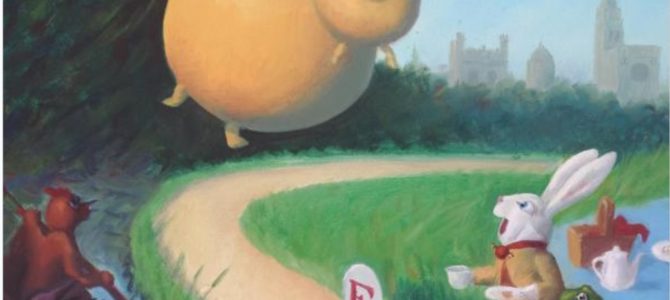
“Mr. Mehan’s Mildly Amusing Mythical Mammals,” by Matthew Mehan, illustrated by John Folley (Tan Books, 2018).
I once heard a man complain about Christian children. Like him, I was a presenter at an event where we dressed as historical figures and talked to kids from different schools. “Mark Twain” had developed his role—white suit, mop of hair, caustic humor, and all—very thoroughly. The dialogue he delivered to group after group was intended to be funny.
Many of his jokes involved biblical stories, and the minute the kids from Christian schools heard reference to Adam and Eve, they became solemn. They weren’t expecting irreverence, so the punchlines flew straight over their heads.
He is not the first person to claim that Christians can’t take a joke. The proper response to that accusation is nicely encapsulated in a line from the movie “Gosford Park.” Upon being told that Brits have no sense of humor, the maid Elsie responds demurely, “We do when something’s funny, sir.”
Actually, the problem is not that Christians don’t laugh enough. After all, it wasn’t Richard Dawkins who invented The Babylon Bee. The real problem is that we live in a world with a warped sense of humor.
The 21st century is caught in a strange dichotomy. On the one hand, flippancy is everywhere. Mockery is a highly successful form of clickbait. Crass one-liners are treated as if they were persuasive rhetoric.
On the other hand, the particular social causes of our era—especially those involving race or sexual identity—are shrouded in such tremendous solemnity that joking about them in any way is an unpardonable sin. It is the world, not the church, that has forgotten how to properly enjoy life’s humor.
It is a good thing when Christians are able to show our neighbors how to laugh in a healthy way—how to use humor to cultivate humility, to express zest for God’s creation, and to develop a sense of wonder. “Mr. Mehan’s Mildly Amusing Mythical Mammals” is one such effort.
The book is not an easy volume to describe. It holds a poem for each letter of the alphabet, and the poems describe creatures the author made up. It’s filled with imaginative oil paintings and calligraphic art work.
Despite using the alphabet as the spine to tie it all together, it is not a children’s book in the usual sense. Adults and older kids are most likely to enjoy it and to appreciate the large glossary full of historical references, written in a style reminiscent of the vigorous, intelligent nonsense more often found in books written by Brits who lived through World War I or II.
“Mr. Mehan’s Mildly Amusing Mythical Mammals” is a little difficult to parse because it fits neither sides of our culture’s dichotomy. It discards the sophistication of modern mockery by treating nonsense seriously. Both author and illustrator have clearly devoted their hearts to their fantastical, imaginary animals.
At the same time, it isn’t William Bennett’s “Book of Virtues,” intended to inculcate a list of moral values. Nor, of course, is it designed to subvert cultural expectations via genderswapped, politically woke mammals or anything else patently important. It is merely itself.
And it is special. There is unexpected charm in a tiny-winged creature like the Blug, who is “quite a slug,” but “seems not to care, / As he happily chugs through the cumbersome air.” There is something invigorating about the Inowallah, who perch,
Up in tree-tops old as seas,
Swaying in a tropic breeze,
Giving out its haunting call,
To the other Inowall.
There is, also, a warning to readers in the gloom of the Evol whose eyes have lost sight: “First colors failed, then by degrees, / The shadows showed him whate’er he pleased.”
Many readers will wonder what they are supposed to do with the poems—how seriously to take them, how deeply to look for hidden meanings or cultural connections. Some readers will find this frustrating. I would have liked to see a little more overall cohesion in the book. Two of the characters appear and reappear just enough to provide a hint of overarching plot, but this could have been made more satisfying with a little more development.
Yet reading this book it is like hanging out with smart people who love life, love learning, and who talk in interesting ways, without necessarily feeling a need to talk about anything serious. It breathes a kind of joyfulness.
When C.S. Lewis wrote his dedication for “The Lion, the Witch, and the Wardrobe,” he suggested that fairy tales belong to the young but also to those old enough to begin reading them again; and Mehan too addresses both children and adult readers. “Mr. Mehan’s Mildly Amusing Mythical Mammals” may be difficult to describe, but it has what matters most: that vital spark that brings good books alive. It is well worth sharing with your family this Christmas season and beyond.









